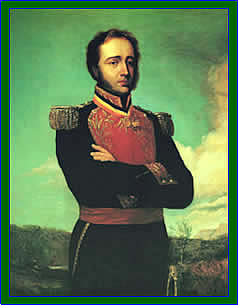 |
| Portrait of Gregor MacGregor |
The problem with MacGregor is that he was becoming known for bragging more than his record could show for it. He claimed outlandish victories that didn't exist and his actual record was usually filled with failures, defeats, and outright incompetence on his part. Another great blunder came in 1817 when MacGregor attempted to "conquer" Florida (then controlled by Spain) by using War of 1812 vets from Georgia and South Carolina. He spread word that a group of 1000 men were to attack the garrison of about 100 Spanish troops. When MacGregor's men attacked, most of the Spanish fled. Unfortunately, the US government didn't come to his aid because President Monroe was in talks for acquiring all of Florida (not just the eastern side). His forces had to give up control soon.
And then came MacGregor's grand place in history: he moved back to London in 1820, claiming to be the Prince of the Principality of Poyais, an independent nation on the Bay of Honduras. He spread stories of Poyais, beginning with the leader of the area: King George Frederic Augustus I. King George supposedly gave the land to MacGregor, who in turn was spreading the word about it in England. He claimed to have started civil service, an army, and a democracy. He claimed he needed British settlers and money to get the territory going. Many business men jumped at the opportunity and gave him a lot of money. He made claims about his ancestors from Scotland, so he concentrated his efforts there, setting up offices in Edinburgh and Glasgow. By 1822, he'd written and published a book about Poyais which only furthered people's excitement about the trip.
In September 1822, the first ship left for Poyais. It contained lawyers and doctors mostly, all who were promised positions in the civil service. In January 1823, they arrived, but what they found wasn't what they were promised. They found a jungle without any attempt at clearing it, some natives, a few American hermits, and the ruins of a hundred year old civilization attempt (which was in the place where the capital of Poyais was supposed to be located). Worse yet, the ship that brought them ended up being swept away in a storm, so they were stranded. The men, none of which had ever been in the wild before, argued over who would do what to help them survive. In April, a ship found them by accident. When told of what happened, the captain said there was no Poyais, and he even found King George and brought him to the settlers. King George said that he'd revoked the land rights when MacGregor had assumed sovereignty over all the land. The captain took the settlers to British Honduras, where eventually they boarded another ship for England. Of the 270 who sailed for Poyais, only 90 made it back alive.
The papers were all over the story, but even the men who survived didn't believe that MacGregor was to blame. They thought it was his assistants who'd misled him. The event went to court and MacGregor was dismissed of any charges, but by then he'd left for Paris. In 1825-26, he tried the same scheme in France. Once again, he went to court, and once again his associates were found guilty and he was not. For the rest of the 1820's-30's, he tried various Poyais schemes. He tried over and over to get money in exchange for a position or service in Poyais. By then, most people were wise to his schemes. In 1839, the year after his second wife died, he moved to Venezuela and gained his citizenship. He lived off a military pension for serving in their military and helping to gain their independence. He died in 1845. Once a scammer, always a scammer I suppose.
Bet you didn't know that!
No comments:
Post a Comment